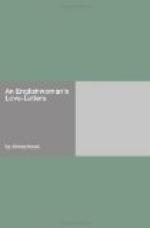I look at you and wonder so how you have grown to this—to have become king so quietly without any coronation ceremony. You have thought more than you should for happiness at your age; making me, by that one line in your forehead, think you were three years older than you really are. I wish—if I dare wish you anything different—that you were! It makes me uncomfortable to remember that I am—what? Almost half a year your elder as time flies:—not really, for your brain was born long before mine began to rattle in its shell. You say quite old things, and quietly, as if you had had them in your mind ten years already. When you told me about your two old pensioners, the blind man and his wife, whom you brought to so funny a reconciliation, I felt ("mir war, ich wuszte nicht wie”) that I would like very much to go blindfold led by you: it struck me suddenly how happy would be a blindfoldness of perfect trust such as one might have with your hands on one. I suppose that is what in religion is called faith: I haven’t it there, my dear; but I have it in you now. I love you, beginning to understand why: at first I did not. I am ashamed not to have discovered it earlier. The matter with you is that you have goodness prevailing in you, an integrity of goodness, I mean:—a different thing from there being a whereabouts for goodness in you; that we all have in some proportion or another. I was quite right to love you: I know it now,—I did not when I first did.
Yesterday I was turning over a silly “confession book” in which a rose was everybody’s favorite flower, manliness the finest quality for a man, and womanliness for a woman (which is as much as to say that pig is the best quality for pork, and pork for pig): till I came upon one different from the others, and found myself saying “Yes” all down the page.
I turned over for the signature, and found my own mother’s. Was it not a strange sweet meeting? And only then did the memory of her handwriting from far back come to me. She died, dear Highness, before I was seven years old. I love her as I do my early memory of flowers, as something very sweet, hardly as a real person.
I noticed she loved best in men and women what they lack most often: in a man, a fair mind; in a woman, courage. “Brave women and fair men,” she wrote. Byron might have turned in his grave at having his dissolute stiff-neck so wrung for him by misquotation. And she—it must have been before the eighties had started the popular craze for him—chose Meredith, my own dear Meredith, for her favorite author. How our tastes would have run together had she lived!
Well, I know you fair, and believe myself brave—constitutionally, so that I can’t help it: and this, therefore, is not self-praise. But fairness in a man is a deadly hard acquirement, I begin now to discover. You have it fixed fast in you.




